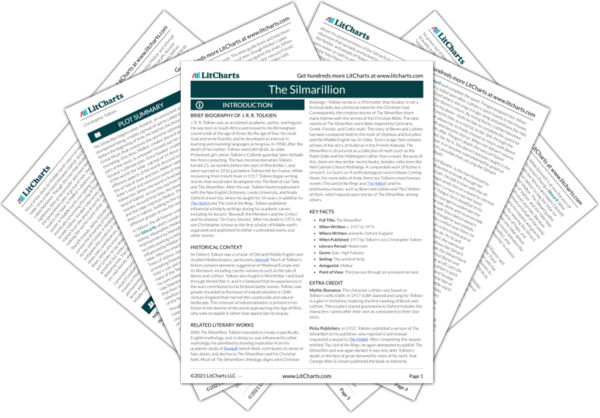Fëanor Quotes in The Silmarillion
Chapter 7 Quotes
Thus ere the Valar were aware, the peace of Valinor was poisoned. The Noldor began to murmur against them, and many became filled with pride, forgetting how much of what they had and knew came to them in gift from the Valar. Fiercest burned the new flame of desire for freedom and wider realms in the eager heart of Fëanor; and Melkor laughed in his secrecy, for to that mark his lies had been addressed, hating Fëanor above all, and lusting ever for the Silmarils. But these he was not suffered to approach […] for Fëanor began to love the Silmarils with a greedy love, and grudged the sight of them to all save to his father and his seven sons; he seldom remembered now that the light within them was not his own.
Chapter 9 Quotes
Then perforce Morgoth surrendered to her the gems that he bore with him, one by one and grudgingly; and she devoured them, and their beauty perished from the world. Huger and darker yet grew Ungoliant, but her lust was unsated. ‘With one hand thou givest,’ she said; ‘with the left only. Open thy right hand.’
In his right hand Morgoth held close the Silmarils, and though they were locked in a crystal casket, they had begun to burn him, and his hand was clenched in pain; but he would not open it. ‘Nay!’ he said. ‘Thou has had thy due. For with my power that I put into thee thy work was accomplished. I need thee no more. These things thou shalt not have, nor see. I name them unto myself for ever.’
Their Oath shall drive them, and yet betray them, and ever snatch away the very treasures that they have sworn to pursue. To evil end shall all things turn that they begin well; and by treason of kin unto kin, and the fear of treason, shall this come to pass. The Dispossessed shall they be for ever.
Ye have spilled the blood of your kindred unrighteously and have stained the land of Aman. For blood ye shall render blood, and beyond Aman ye shall dwell in Death’s shadow. For though Eru appointed you to die not in Eä, and no sickness may assail you, yet slain ye may be, and slain he shall be: by weapon and by torment and by grief; and your houseless spirits shall come then to Mandos.
Chapter 11 Quotes
But at that last word of Fëanor: that at the least the Noldor should do deeds to live in song for ever, he raised his head, as one that hears a voice far off, and he said: ‘So shall it be! Dear-bought those songs shall be accounted, and yet shall be well-bought. For the price could be no other. Thus even as Eru spoke to us shall beauty not before conceived be brought into Eä, and evil yet be good to have been.’
But Mandos said: ‘And yet remain evil. To me shall Fëanor come soon.’
Chapter 13 Quotes
Then Fingon the valiant, son of Fingolfin, resolved to heal the feud that divided the Noldor […] Long before, in the bliss of Valinor, before Melkor was unchained, or lies came between them, Fingon had been close in friendship with Maedhros; and though he knew not yet that Maedhros had not forgotten him at the burning of the ships, the thought of their ancient friendship stung his heart. Therefore he dared a deed which is justly renowned among the feats of the princes of the Noldor: alone, and without the counsel of any, he set forth in search of Maedhros; and aided by the very darkness that Morgoth had made he came unseen into the fastness of his foes.
Chapter 20 Quotes
Thus was the treachery of Uldor redressed; and of all the deeds of war that the fathers of Men wrought in behalf of the Eldar, the last stand of the Men of Dor-lómin is most renowned.
[…]
Last of all Húrin stood alone. Then he cast aside his shield, and wielded an axe two-handed; and it is sung that the axe smoked in the black blood of the troll-guard of Gothmog until it withered, and each time that he slew Húrin cried: ‘Aurë entuluva! Day shall come again!’
Chapter 24 Quotes
‘If it be truly the Silmaril which we saw cast into the sea that rises again by the power of the Valar, then let us be glad; for its glory is seen now by many, and is yet secure from all evil.’ Then the Elves looked up, and despaired no longer; but Morgoth was filled with doubt.












